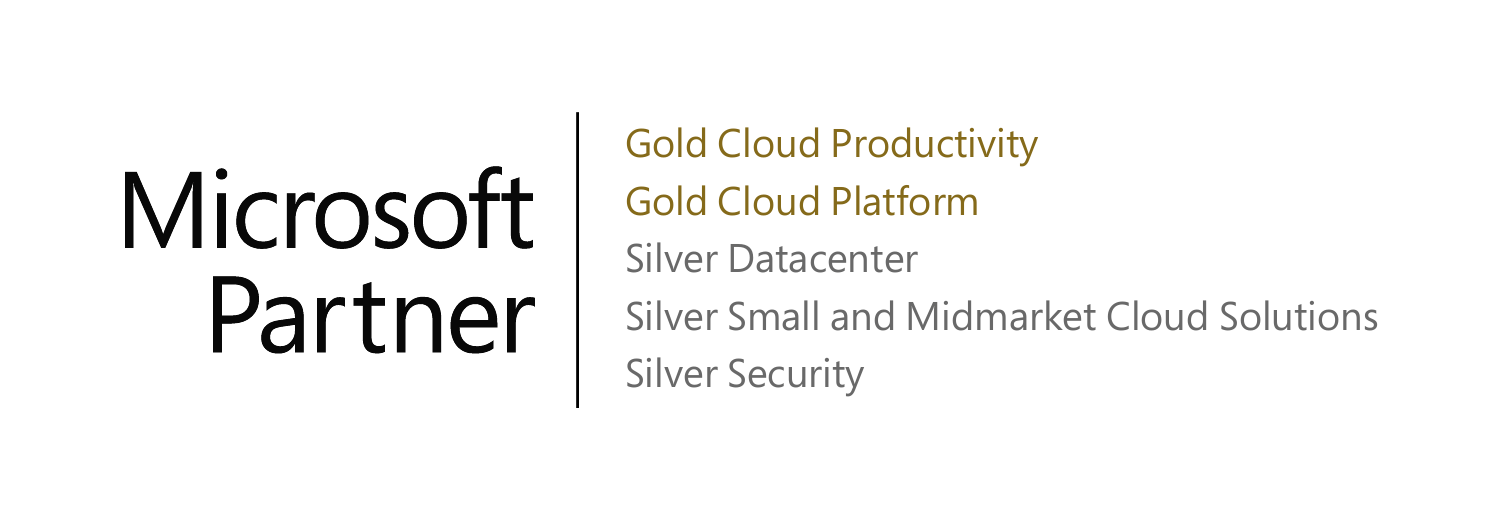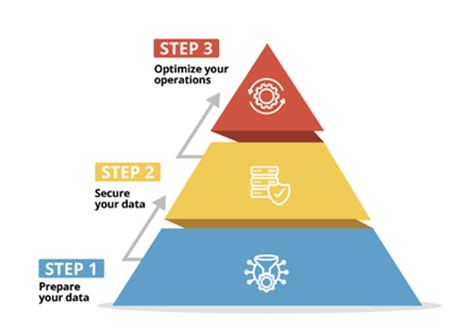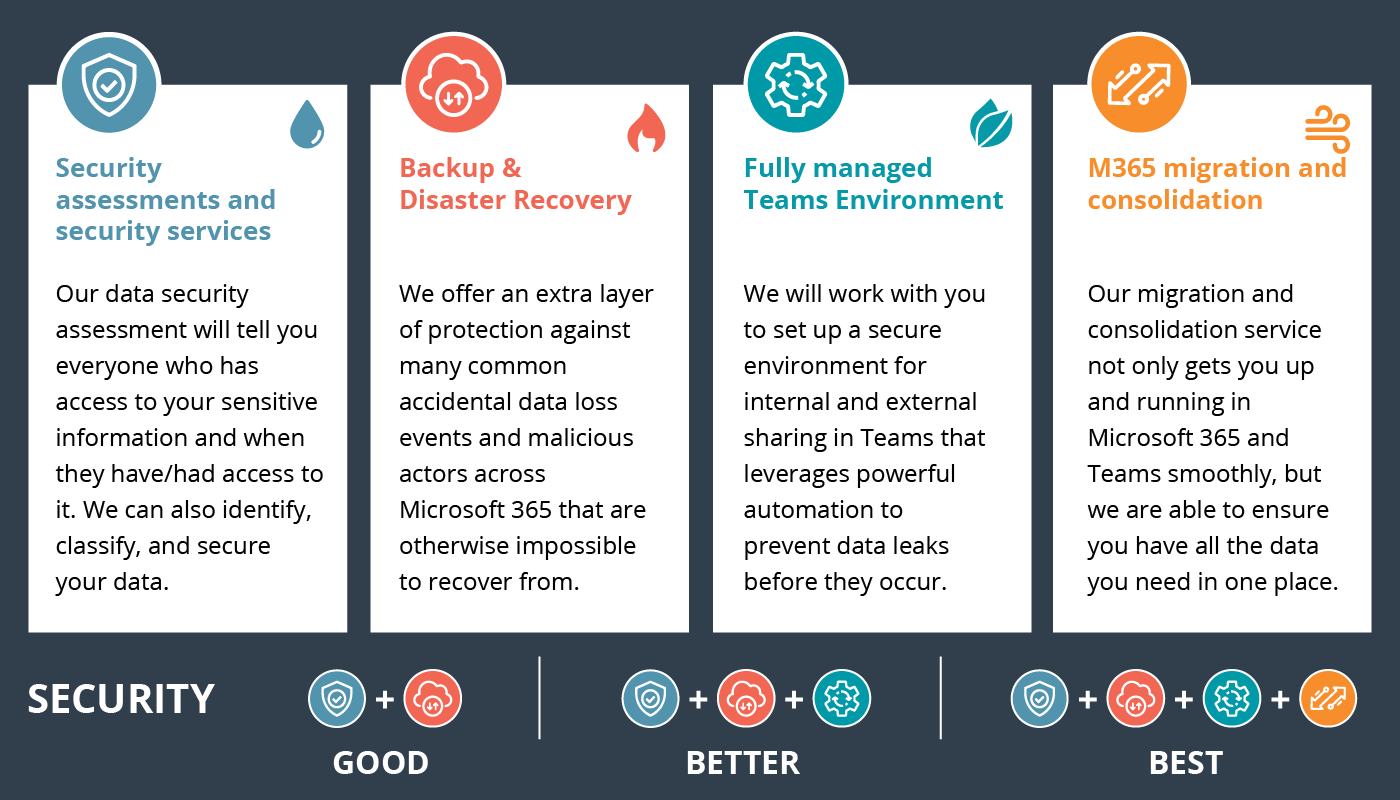4 Reasons To Consider FSLogix
Download Sample M365 Risk AssessmentIn November 2018, Microsoft announced the procurement of FSLogix. In March 2019, Microsoft made the official declaration that FSLogix would be allowed to use for anybody with RDS, VDA, or WVD licenses. Here are a few reasons why you should consider utilizing this solution instead of the more conventional profile management options.
SO, WHAT IS FSLOGIX?
FSLogix is a set of solutions that enhance, enable, and simplify non-persistent Windows computing environments. FSLogix solutions are appropriate for virtual environments in both public and private clouds. FSLogix solutions may also be used to create more portable computing sessions when using physical devices. FSLogix solutions include:
- Profile Container
- Office Container
- Application Masking
- Java Version Control
KEY CAPABILITIES:
- Redirect user profiles to a network location using Profile Container. Profiles are placed in VHD(X) files and mounted at run time. It is common to copy a profile to and from the network when a user signs in and out of a remote environment. Because user profiles can often be large, sign in and sign out times often became unacceptable. Mounting and using the profile on the network eliminates delays often associated with solutions which copy files.
- Redirect only the portion of the profile that contains Office data by using Office Container. Office Container allows an organization already using an alternate profile solution to enhance Office in a non-persistent environment. This functionality is useful with the Outlook .OST file.
- Applications use the profile as if it were on the local drive. Because the FSLogix solutions use a Filter Driver to redirect the profile, applications do not recognize that the profile is on the network. Obscuring the redirection is important because many applications will not work properly with a profile stored on remote storage.
- Profile Container is used with Cloud Cache to create resilient and highly available environments. Cloud Cache places a portion of the profile VHD on the local hard drive. Cloud Cache also allows an administrator to specify multiple remote profile locations. The Local Cache, with multiple remote profile containers, insulates users from network and storage failures.
- Application Masking manages access to an application, font, printer, or other items. Access can be controlled by user, IP Address range, and other criteria. Application Masking significantly decreases the complexity of managing large numbers of gold images.
WHY SHOULD YOU USE IT?
- Profile Containers. FSLogix Apps uses advanced filtering and redirection to enable Profile Containers and our other core functionality. At logon, the FSLogix Apps agent connects to the profile container for the specific user and streams only the information required in real time. This approach reduces the amount of file open requests and network traffic by nearly 99%. This process is transparent to the client operating system and integrates seamlessly with Citrix, VMWare, and MS server and VDI OS virtualization technologies. Benefits include the following:
- Shorter logon and logoff time, with up to an 85% improvement seen in some environments.
- Less traffic and processing load on file servers.
- Lower chance of profile corruption. For those of you who encounter that issue on a regular basis, and I am sure many of you do, this is obviously a big deal.
- Office 365 Containers. FSLogix provides several features and enhancements not available with any other solution for Office 365.
- Outlook Real-Time Search – enables inbox and personal folder search to work as designed on both XenApp and XenDesktop, with maximum performance, and no workarounds requiring end-user training or unique behavior between physical and virtual environments.
- OneDrive for Business – Enable OneDrive for Business in XenApp and XenDesktop. Roam OneDrive for Business user data seamlessly in every virtual desktop environment without the need to resync at each logon.
- Skype for Business Global Address List – Large GAL’s can be an issue in non-persistent environments causing the GAL to be downloaded every time a user connects to a system. This can cause heavy loads on exchange systems, storage, and compute platforms. With FSLogix we download once, and update as many changes to get published, reducing the overall data IO.
- OneNote – Enable local OneNote cache that can roam with the user from host to host and desktop to desktop.
- Java Control. A common requirement in Enterprise environments is the need to support multiple Java versions. This generally occurs when IT needs to upgrade Java for security and interoperability reasons but has applications or websites that require an older version of Java to function properly. These applications and websites may not be easy or cost effective to update, or may also be managed by third parties outside the control of the IT department. The Java Redirection feature allows all applications and websites to run with the version of Java they’re required to operate properly – all within the same client system.
- Windows Image Reduction. With the combination of App Containers and Unified Base Images, administrators can address all app, plugin, and config needs for all users in your current and forward-looking deployment plans. FSLogix Apps eliminates multiple layers of management infrastructure, thus creating a single, unified approach to image management, profile access, and application provisioning. FSLogix Apps helps to fully optimize operational costs for delivering specialized applications or full, virtualized desktops to individual users or a broad base of enterprise users.
LESSONS LEARNED
While implementing this solution for our clients, we’ve made a few notable observations.
- File Share. If you are using a Windows file share, the disk should be formatted using the ReFS file system instead of NTFS. This format is significantly more efficient when it comes to the VHD/VHDX files used by FSLogix. In addition, be sure to disable offline files on the share.
- OneDrive. In Windows Server 2016, there is no OneDrive client by default. OneDrive must be installed into each user’s profile one time for FSLogix redirection to function properly. This can be performed manually or scripted using a basic powershell script run at login.
- Virtual Disk Format. Assuming your environment consists of Windows 2012 servers or newer, you will want to make sure to configure FSLogix to use VHDX instead of VHD for virtual disks. VHDX has several advantages over the VHD format, but the default when implementing FSLogix is VHD.
Akins IT has incorporated FSLogix for numerous customers with great success. Our clients have witnessed significant performance improvements, as well as improved manageability over the traditional options (i.e. Windows Roaming Profiles and Citrix UPM). The ultimate goal is to make the virtual Windows workspace perform as good as or even better than a local Windows workspace. In addition to it being a nice upgrade, it also happens to be free! Of course, there are time-related costs involved with implementation, but licensing is not a concern if you have RDS, VDA, or WVD entitlement.
To learn more on how FSLogix can be tailored to fit your environment and achieve your goals, please reach out to an Akins team member to schedule a meeting/call for a deeper dive. Cheers!
Solve Your IT Challenges
Increase your network's uptime and keep your connections secure with Akins IT
Attend An Event
Attend one of our events to learn something new from our partners and experts
Solve Your
IT Challenges
Increase your network's uptime and keep your connections secure with Akins IT.
arctic wolf labs
threat report 2024
This report offers expert insights into attack types, root causes, top vulnerabilities, TTPs, and more.
1301 Dove Street #130
Newport Beach, California 92660
Mailing Address:
3406 Via Lido, Suite 1A-22
Newport Beach, California 92663

All Rights Reserved | Akins IT | Privacy Policy | Terms of Service | Disclaimer
Website By: EnlightWorks



